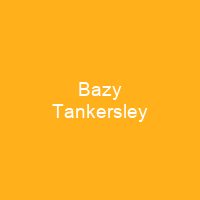Who Was Bazy Tankersley?
Bazy Elizabeth ‘Bazy’ Tankersley (née McCormick, formerly Miller) was a remarkable woman whose life spanned from 1921 to 2013. Born in Chicago as the youngest of three children, she grew up in a family with political and social influence. Her father, Joseph Medill McCormick, served as a Senator from Illinois, while her mother, Ruth Hanna McCormick, was a member of the US House of Representatives.
But Bazy’s story is not just about her family background; it’s also about her passion for Arabian horses and her dedication to journalism. Let’s dive into this fascinating life and explore how she became one of the most influential figures in both horse breeding and newspaper publishing.
A Passion for Arabian Horses
When Bazy was young, tragedy struck as her father passed away when she was just a child. This led to her family moving to New Mexico and then Colorado. It was during these summers on the East Coast that Bazy developed a deep love for Arabian horses. Her journey with these majestic creatures began in 1941 when she started her horse breeding operation, Al-Marah Arabians, in Tucson, Arizona.
Al-Marah Arabians grew to become one of the largest Arabian farms in the United States. Bazy was not just a breeder; she was also an innovator and a patron. She set up apprenticeship programs and supported numerous charities, ensuring that her legacy extended far beyond the stables.
From Journalism to Publishing
Bazy’s career in journalism started early. At 18, she began working as a reporter for the Rockford Star. Her talent and ambition quickly led her to purchase and merge several newspapers with her husband Peter Miller. By age 28, Bazy had become Vice-President of the Washington Times-Herald under Robert McCormick’s guidance.
However, disagreements over editorial direction and personal relationships led Bazy to leave the newspaper in 1954. She sold the paper to The Washington Post but continued writing a column until her focus shifted entirely to horse breeding. Her time at the Washington Times-Herald was marked by controversy, including a $5.1 million lawsuit against McCarthy and Drew Pearson.
Al-Marah Arabians: A Legacy of Excellence
Bazy’s dedication to Arabian horses was unwavering. She emphasized athleticism and disposition in her breeding program, using Crabbet bloodlines extensively. Her foundation stallion, Indraff, sired 254 purebred Arabians over his lifetime. Bazy also imported key horses from Lady Wentworth’s estate, further enriching the Al-Marah herd.
By 1957, Al-Marah was the largest Arabian horse farm in the United States. Bazy’s breeding program was not just about numbers; it was about creating a legacy that would endure for generations. Her work with genetics and selective breeding ensured that her horses were of the highest quality.
Return to Arizona
In 1975, Bazy moved back to Tucson, where she designed many buildings on her property. The Al-Marah Arabian Farm and Hat Ranch became central to her life. At Hat Ranch, young stock were raised, and an annual think tank meeting was held. Her contributions to the horse industry were recognized with awards like the Arabian Breeder’s Association Lifetime Breeder’s Award in 2003.
Bazy’s commitment to training and education led her to create apprenticeship programs that helped train people for positions in the horse industry. Her influence extended beyond breeding; she was a consistent advocate for the Arabian breed, promoting it through various activities like endurance riding, show ring competitions, and racing.
Environmental Advocacy
Beyond her work with horses, Bazy Tankersley was also an environmentalist. She supported charities that helped disabled children and cultural activities in Maryland and Arizona. Her financial support included private schools, ensuring a broader impact on society.
Carl Hodges praised her as such, highlighting her commitment to preserving the natural environment. Bazy’s efforts with Defenders of Wildlife to protect Aravaipa Canyon further underscored her dedication to environmental causes.
A Legacy of Impact
Bazy Tankersley’s life was a testament to resilience and passion. From her early days as a young reporter to becoming one of the largest Arabian horse breeders in the United States, she left an indelible mark on both journalism and equestrian sports.
Her legacy continues through the horses she bred and the people she trained. The University of Arizona now owns the Tucson Al-Marah Ranch, ensuring that her work with Arabian horses will be preserved for future generations. The Hat Ranch has a conservation easement, protecting it from further development and maintaining its natural beauty.
Bazy Tankersley’s story is one of multifaceted achievement, blending journalism, horse breeding, and environmental advocacy into a rich tapestry of contributions to society. Her life serves as an inspiration for those who seek to make a difference in multiple areas of their lives.

You want to know more about Bazy Tankersley?
This page is based on the article Bazy Tankersley published in Wikipedia (retrieved on December 9, 2024) and was automatically summarized using artificial intelligence.







